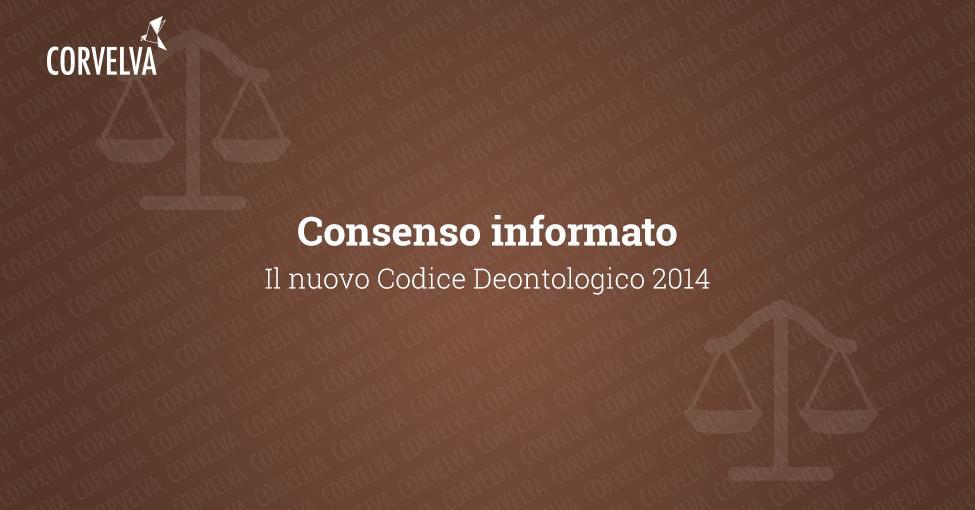Informed consent in the new 2014 Code of Ethics

Art. 33 Information and communication with the assisted person
The doctor guarantees the assisted person or his legal representative comprehensive and comprehensible information on prevention, the diagnostic process, the diagnosis, the prognosis, the therapy and any diagnostic-therapeutic alternatives, on the foreseeable risks and complications, as well as on the behaviors that the patient will have to observe in the care process.
The doctor adapts the communication to the understanding capacity of the assisted person or his legal representative, responding to every request for clarification, taking into account the sensitivity and emotional reactivity of the same, in particular in the case of serious or poor prognosis, without excluding elements of hope .
The doctor respects the necessary confidentiality of the information and the will of the assisted person not to be informed or to delegate the information to another subject, reporting it in the health documentation.
The doctor guarantees the minor elements of useful information so that he or she understands his health condition and the programmed diagnostic-therapeutic interventions, in order to involve him in the decision-making process.
Art. 34 Information and communication to third parties
The information to third parties can be provided with the explicit consent expressed by the assisted person, without prejudice to the provisions of art. 10 and 12, when the health or life of the person himself or of others is in grave danger.
The doctor, in the case of a hospitalized patient, collects any names of the persons indicated by the same to receive the communication of sensitive data.
Art. 35 Informed consent and dissent
The acquisition of consent or dissent is an act of specific and exclusive competence of the doctor, which cannot be delegated.
The doctor does not undertake or continue in diagnostic procedures and / or therapeutic interventions without the preliminary acquisition of informed consent or in the presence of informed dissent.
The doctor acquires, in written and signed form or with other methods of equal documentary effectiveness, the consent or dissent of the patient, in the cases provided for by the law and by the Code and in those foreseenly burdened by a high risk of mortality or by outcomes that affect in a relevant way on psycho-physical integrity.
The doctor takes into due consideration the opinions expressed by the minor in all decision-making processes concerning him.
Art. 36 Urgency and emergency assistance
The doctor ensures indispensable assistance, in urgent and emergency conditions, in compliance with the wishes if expressed or taking into account the advance treatment declarations if manifested.
Art. 37 Consent or dissent of the legal representative
In the case of a minor or incapacitated patient, the doctor acquires informed consent or dissent from the legal representative to diagnostic procedures and / or therapeutic interventions.
The doctor reports to the competent Authority the opposition by the informed and aware minor or by whoever exercises parental authority to a treatment deemed necessary and, in relation to the clinical conditions, in any case proceeds promptly with the treatments deemed indispensable and non-postponable.
Art. 38 Advance treatment declarations
The doctor takes into account the advance declarations of treatment expressed in writing, signed and dated by a capable person and subsequent to medical information of which documentary trace remains.
The advance declaration of treatment proves the freedom and awareness of the choice on diagnostic procedures and / or therapeutic interventions that you want or do not want to be implemented in conditions of total or serious impairment of the cognitive or evaluative faculties that prevent the expression of will current.
The doctor, in taking into account the advance declarations of treatment, verifies their logical and clinical congruence with the current condition and inspires his own conduct to respect the patient's dignity and quality of life, giving clear expression to them in the health documentation.
The doctor cooperates with the legal representative by pursuing the best interest of the patient and in the event of a conflict makes use of the decisive judgment provided for by the legal system and, in relation to the clinical conditions, in any case proceeds promptly with the treatments deemed indispensable and non-postponable.
Art. 39 Assistance to patients with poor prognosis or with definitive impairment of the state of consciousness
The doctor does not abandon the patient with a poor prognosis or with definitive impairment of the state of consciousness, but continues to assist him and if in terminal conditions he imprints his work on the sedation of pain and relief from suffering, protecting the will, dignity and quality of life.
In the event of definitive impairment of the patient's state of consciousness, the doctor continues with pain therapy and palliative care, implementing treatments to support vital functions as long as deemed proportionate, taking into account the advance treatment declarations.

